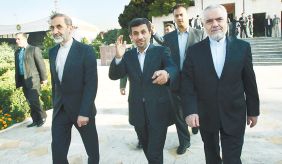Reports in Iran of direct talks with the U.S. lend weight to the perception that a diplomatic breakthrough is approaching.
"What were Hossein Taeb and Ali Akbar Velayati doing in the United States?," asked the Iranian website Kaleme. Indeed, what was this pair up to there?
Velayati, a former foreign minister who for years has been foreign policy adviser and special diplomatic envoy to Iran's supreme religious leader, Ayatollah Ali Khamenei, and Taeb, who heads the Revolutionary Guards' intelligence bureau, have denied visiting the United States or talking with U.S. officials about opening a direct channel for negotiation between the two countries.
Kaleme is associated with Iranian opposition leader Mir Hossein Mousavi, who is under house arrest together with his wife, and could be suspected of having an interest in depicting the regime as betraying its principles. But when the Tabnak news site, which is associated with Mohsen Rezaee, a former head of the Revolutionary Guards who is considered a possible presidential candidate in the next election, publishes an opinion piece that does not rule out contacts with the United States, while naming countries, including Britain and Israel, that oppose such contacts, it can be taken as a sign of change within the Iranian leadership.
It is very notable that U.S. President Barack Obama, who was quick to deny a New York Times report that Iran has agreed to open a direct channel for negotiations, changed his tune during his debate with Mitt Romney last week. "I'm pleased that you now are endorsing our policy of applying diplomatic pressure and potentially having bilateral discussions with the Iranians to end their nuclear program," Obama told Romney. Romney, by the way, did not even mention such talks, it was Obama who brought them up.
Despite sweeping denials from the White House, its spokesman does not dispute the fact of talks between U.S. and Iranian officials since 2009. Hints and rumors of an agreement over a direct dialogue predated the loudly received Times article. On October 4 the conservative WorldNetDaily website predicted in an article titled "October Surprise? Obama Secret Iran Deal Cut" that Iran would announce a temporary halt to its uranium enrichment ahead of the November 6 U.S. election.
The report went on to say that a three-person delegation from the Obama administration, headed by a woman, was negotiating with representatives of Khamenei to persuade Iran to suspend its uranium enrichment program; one of the delegation's means of persuasion was a reminder that the United States has prevented Israel from attacking Iran.
The article claimed that Velayati secretively traveled to Qatar to meet with the U.S. group and that the woman heading the delegation had met with him more than 10 times in 20 years. "October Surprise" was written by Reza Kahlili, the pseudonym of a self-proclaimed former CIA agent and spy in the Revolutionary Guards. Kahlili's best-selling memoir "A Time to Betray: The Astonishing Double Life of a CIA Agent Inside the Revolutionary Guards of Iran," in which he discusses Iran's intention to strike Israeli and U.S. targets, was published in April. Kahlili does not conceal his conservative positions; WND was founded by Joseph Farah, an American of Syrian extraction, and has made proving the failings of the Obama administration its mission.
But the political outlook of the site and of the article's author alone are not grounds for dismissing the report. Nor is the sweeping denial issued last Thursday by Qatar's Prime Minister and Foreign Minister, Hamad bin Jassim bin Jaber Al Thani. (He said no U.S.-Iranianian meetings were held in Doha. ) Qatar maintains close ties with Iran and the American government. More important is that Qatar is an ambitious country eager to earn credit for mediating between the two states.
Tehran is not just denying the existence of such meetings or an intention to stage such talks: Last month Velayati himself declared that Iran's policy toward the United States has not changed and is based on the legacy of Ayatollah Ruhollah Khomeini. Some newspapers even exploited the reports to denounce Iranian President Mahmoud Ahmadinejad and to suggest that he initiated the talks with Washington in order to extricate himself from the crisis he has created for Iran.
Little time is left to determine whether the direct dialogue between Iran and the United States was a trial balloon, an election campaign trick or a genuine strategic decision that signals a historic turn by both countries. If Obama is reelected, European members of P5-plus-1 (the five permanent members of the United Nations Security Council and Germany ) are likely to propose another meeting with Iran, the first since the talks last June in Moscow. According to Western reports the group would propose a new negotiating formula that would significantly ease the sanctions against Iran. In return, Iran would stop enriching uranium and would deliver to a third country the uranium in its possession enriched to 20 percent.
Direct Iran-U.S. talks could have far-reaching regional implications that go beyond the issue of uranium enrichment. Iran would achieve equal status as a global power negotiating with another, as opposed to standing before a tribunal of UN Security Council members. The very existence of such a dialogue could serve as a stamp of approval for Iran, signaling Cairo, for example, that it can engage in diplomatic talks with Tehran. It would also hint to Saudi Arabia, Iran's bitter rival, that Riyadh does not hold exclusive rights to a direct channel to the White House.
Some will see this as too high a price to pay for the small chance that Iran will indeed stop enriching uranium. But we believe it would be the necessary cost, if such a dialogue materializes, of eliminating the Iranian nuclear threat. And it would be a small price to pay, compared to that of a war.
The Iran Project is not responsible for the content of quoted articles.
prev
next
Latest News
Most viewed











